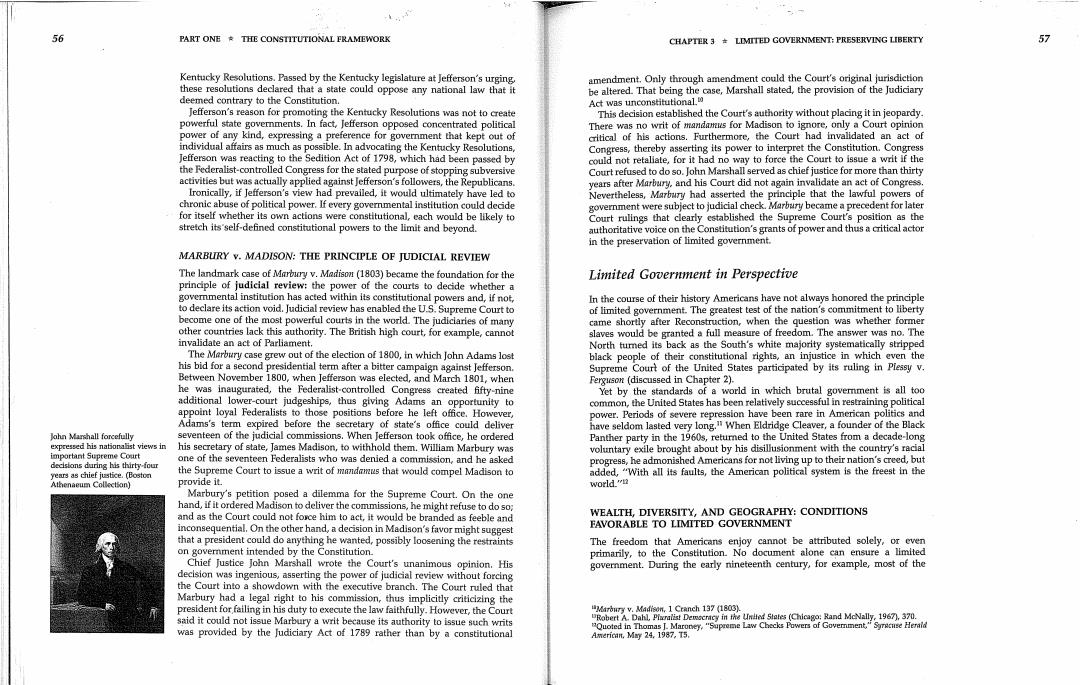正在加载图片...

56 PART ONE THE CONSTITUTIONAL FRAMEWORK CHAPTER 3 LIMITED GOVERNMENT:PRESERVING LIBERTY 57 Kentucky Resolutions.Passed by the Kentucky legislature at Jefferson's urging amendment.Only through amendment could the Court's original jurisdiction these resolutions declared that a state could oppose any national law that it be altered.That being the case,Marshall stated,the provision of the Judiciary deemed contrary to the Constitution. Act was unconstitutional.0 Jefferson's reason for promoting the Kentucky Resolutions was not to create This decision established the Court's authority without placing it in jeopardy. powerful state governments.In fact,Jefferson opposed concentrated political There was no writ of mandamus for Madison to ignore,only a Court opinion power of any kind,expressing a preference for government that kept out of critical of his actions.Furthermore,the Court had invalidated an act of ndividual affairs as much as possible.In advocating the Kentucky Resolutions, Congress,thereby asserting its power to interpret the Constitution.Congress Jefferson was reacting to the Sedition Act of 1798,which had been passed by could not retaliate,for it had no way to force the Court to issue a writ if the the Federalist-controlled Congress for the stated purpose of stopping subversive Court refused to do so.John Marshall served as chief justice for more than thirty activities but was actually applied against Jefferson's followers,the Republicans. years after Marbury,and his Court did not again invalidate an act of Congress Ironically,if Jefferson's view had prevailed,it would ultimately have led to Nevertheless,Marbury had asserted the principle that the lawful powers of chronic abuse of political power.If every governmental institution could decide government were subject to judicial check.Marbury became a precedent for later for itself whether its own actions were constitutional,cach would be likely to Court rulings that clearly established the Supreme Court's position as the stretch its'self-defined constitutional powers to the limit and beyond. authoritative voice on the Constitution's grants of power and thus a critical actor in the preservation of limited government. MARBURY MADISON:THE PRINCIPLE OF JUDICIAL REVIEW The landmark case of Marbury v.Madison (1803)became the foundation for the Limited Government in Perspective principle of judicial review:the power of the courts to decide whether a govemmental institution has acted within its constitutional powers and,if not, In the course of their history Americans have not always honored the principle to declare its action void.Judicial review has enabled the U.S.Supreme Court to of limited government.The greatest test of the nation's commitment to liberty become one of the most powerful courts in the world.The judiciaries of many came shortly after Reconstruction,when the question was whether former other countries lack this authority.The British high court,for example,cannot slaves would be granted a full measure of freedom.The answer was no.The invalidate an act of Parliament. North tumed its back as the South's white majority systematically stripped The Marbury case grew out of the election of 1800,in which John Adams lost black people of their constitutional rights,an injustice in which even the his bid for a second presidential term after a bitter campaign against Jefferson Supreme Court of the United States participated by its ruling in Plessy v. Between November 1800,when Jefferson was elected,and March 1801,when Ferguson (discussed in Chapter 2). he was inaugurated,the Federalist-controlled Congress created fifty-nine Yet by the standards of a world in which brutal government is all too additional lower-court judgeships,thus giving Adams an opportunity to common,the United States has been relatively successful in restraining political appoint loyal Federalists to those positions before he left office.However, power.Periods of severe repression have been rare in American politics and Adams's term expired before the secretary of state's office could deliver have seldom lasted very long.When Eldridge Cleaver,a founder of the Black John Marshall forcefully seventeen of the judicial commissions.When Jefferson took office,he ordered Panther party in the 1960s,retured to the United States from a decade-long xpressed his nabionalst views in his secretary of state,James Madison,to withhold them.William Marbury was voluntary exile brought about by his disillusionment with the country's racial mportant Supreme Court decisions during his thirty-four one of the seventeen Federalists who was denied a commission,and he asked progress,he admonished Americans for not living up to their nation's creed,but vears as chief justice.(Boston the Supreme Court to issue a writ of mmdmmus that would compel Madison to added,"With all its faults,the American political system is the freest in the provide it. world." Marbury's petition posed a dilemma for the Supreme Court.On the one hand,if it ordered Madison to deliver the commissions,he might refuse to do so and as the Court could not force him to act,it would be branded as feeble and WEALTH,DIVERSITY,AND GEOGRAPHY:CONDITIONS inconsequential.On the other hand,a decision in Madison's favor might suggest FAVORABLE TO LIMITED GOVERNMENT that a president could do anything he wanted,possibly loosening the restraints The freedom that Americans enjoy cannot be attributed solely,or even on government intended by the Constitution. primarily,to the Constitution.No document alone can ensure a limited Chief Justice John Marshall wrote the Court's unanimous opinion.His government.During the early nineteenth century,for example,most of the decision was ingenious,asserting the power of judicial review without forcing the Court into a showdown with the executive branch.The Court ruled that Marbury had a legal right to his commission,thus implicitly criticizing the president for failing in his duty to execute the law faithfully.However,the Court Miroury v.Madison,1 Ctanch 137 (1803) said it could not issue Marbury a writ because its authority to issue such writs was provided by the Judiciary Act of 1789 rather than by a constitutional Americnn,May 24,1987,T5